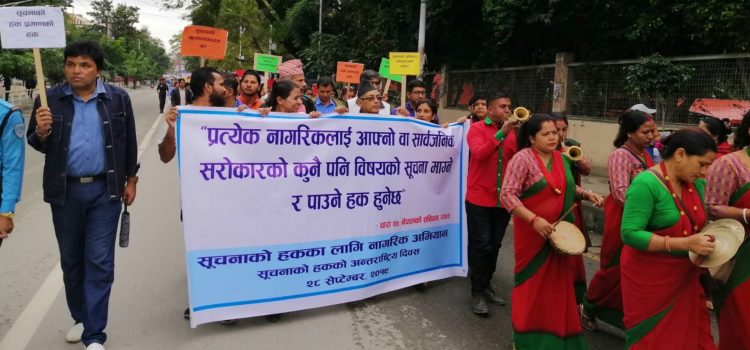Freedom Forum (FF) has continued its endeavor for the cause of good governance by making public agencies transparent and accountable and sensitizing citizens from across the country on importance of information with the use of Right to Information (RTI) applications. In this connection, FF conducted a week long citizen’s campaign for right to information to mark the International Right to Know Day. The campaign begun on September 22 concluded on 28 in collaboration and initiation of various CSOs including FF.
Throughout the week, FF sought information of public importance from the public agencies of all seven provinces with RTI applications. The RTI campaigners and activists at local levels also sought the information at tens of dozens of offices. The information was requested in line with Article 27 of the Nepal’s Constitution 2015, and Section 3 and Section 7 (1) of Right to Information Act, 2007.
As part of the celebration, an 11-point memorandum was also submitted to Prime Minister KP Sharma Oli via Chief Secretary of the government, drawing his attention for the better implementation of constitutionally and legally guaranteed RTI laws. Reminding the Head of the Government that RTI is the oxygen to democratic system, the CSOs urged the government to make the public agencies, which produce, collect and supply information, accountable, transparent and proactive for the disclosure of information.

Similarly, a rally along with mobile RTI clinic was organized in the capital city on September 28. More than 100 organizations, including FF, GoGo Foundation, NGO Federation Nepal, Federation of Nepali Journalists, INSEC, SOCH Nepal, IHRICON, Media Advocacy Group, Samjhauta Nepal and Sharada Foundation from across the country took part in the celebration of the day as the partners of the citizen’s campaign for RTI.
After completion of the rally, Mobile RTI clinic was taken from Bhrikutimandap to New Baneshwor near the Federal Parliament Building, which later was taken back to Ratnapark, Bhotahiti and then to Patan Durbar Square, Pulchowk and finally at Tripureshwor. In the RTI clinic/booth, two-way information on RTI was shared among 300 people. The pamphlets, comprising RTI day initiation, objectives of RTI law, proper implementation measures and others were distributed to more than 7,000 people. The pamphlets were distributed from the beginning of the rally to the end of RTI booth closure.
The campaign called for the government to make the existing RTI central coordination unit and central monitoring committee established at Prime Minister’s Office and Ministry of Communications and Information Technology functional, regularize disclosure of various 20 types of information by public agencies through website and other means, appoint public information officers in all federal, provincial and local governments and public agencies for effective information management, and to ensure security of RTI practitioners, among others.
The CSOs also urged the government to end impunity relating to the violation of RTI laws by chiefs and information officer at public agency, set explicit indicators and standards as part of the national strategy and action plan of SDG to implement RTI in its target 16.10 and set up national mechanism to periodically review the status of access to information and take initiative to join the global initiative of Open Government Partnership and endorse its global declaration.


